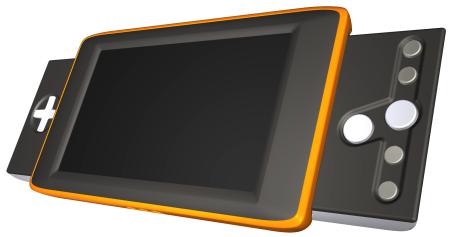Device profile: VeriTouch iVue media player and gaming device
Jun 23, 2004 — by LinuxDevices Staff — from the LinuxDevices Archive — 2 viewsVeriTouch's iVue is a portable Linux based media player, video game player, and personal file storage device featuring multi-user support, biometric authentication, and pervasive security. Though it has yet to launch, the device has already drawn heated criticism and even ridicule from anti-DRM (digital rights management) quarters. However, the device's innovative and pervasive security features may also impress some digital rights advocates.

The VeriTouch iVue has a sleek, simple design
(Click to enlarge)
photo (c)2004 VeriTouch Ltd., used with permission
The iVue is based on Linux, and includes proprietary video and music player software owned by VeriTouch, according to CEO Gary Brant. The device includes an unusually high resolution 1200 x 800 widescreen TFT touchscreen, and only a few simple buttons and controls. According to Brant, “One of our design imperatives was to make it simple enough for a 10-year child to use.”
The device uses biometric fingerprint authentication to provide private and secure file storage and playback for each user. “[Take] for example, a family with two parents and two teenagers,” says Brant. “Each user can have his/her own account, which would basically bring up an iVue desktop which would be unique, and private.”
The biometric keys are generated when each user account is first created, and are subsequently used to authenticate users and encrypt and decrypt files. The keys use a one-way encoding technology, and cannot be converted back into actual fingerprints, according to Brant. Although the keys are used in a private key security architecture, they can be shared as if they were public keys because of the unliklihood of anyone being able to generate them “without a live scan and match from the owner's fingerprint,” Brant said.
Users will be able to purchase music, movies, and games online for download into the device, according to Brant, via 802.11b/g WiFi, Bluetooth, or GPRS wireless interfaces. “iVue interfaces to a variety of online content providers who will be able to provide video games, full-length movies in 16 x 9 widescreen format, and of course, music.”
Users can also download files of their own to the device, and optionally encrypt them using a biometric key, according to Brant. The device will be offered initially with a 120GB harddrive.
Additionally, the device will enclude a secure email and instant messaging client that can be used to send biometrically encrypted messages to authorized recipients using a “Blackberry-style keyboard which ejects underneath the TFT screen,” Brant said. And, the device includes a 1.5 megapixel, 24-bit color camera, the output of which can be biometrically encrypted as well.
Asked if the device used an encrypted filesystem to prevent unauthorized file access by someone gaining physical access to the device, Brant replied, “The iVue is a sealed box with no ports whatsoever except for the battery-charging terminals. If a hacker tries to open the box, we have a special mechanism which issues a command in FLASH ROM that destroys all data on the hard disk when it is next accessed.”
Brant claims the iVue will have an exceptionally high resolution 1200 x 800 touchscreen, in order to support “best of breed” mobile games and video playback. He said the device will offer video performance “even exceeding Sony's much-ballyhooed PlayStation mobile unit.”
What's under the hood?
Brant was reticent about explicit details of the Linux implementation powering the iVue, since it has not yet shipped as a finished product, although a working prototype exists. “iVue is a revolutionary system which many companies large and small wish they had, [so] I don't want to divulge our technology secrets.”
Brant did reveal that the iVue will be based on an ARM9 processor, initially, although “We may introduce a Transmeta Crusoe model, also.”
Brant was similarly reticent about when the device would ship, who helped with the Linux port, and other details. On one point, though, Brant was more than forthcoming. “The iVue Personal Media Player runs Linux, and always has from the very first prototype,” Brant stated.
This article was originally published on LinuxDevices.com and has been donated to the open source community by QuinStreet Inc. Please visit LinuxToday.com for up-to-date news and articles about Linux and open source.